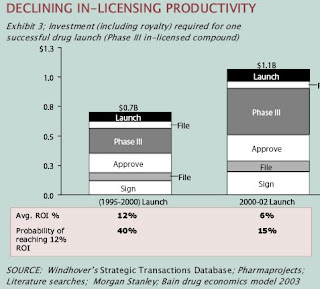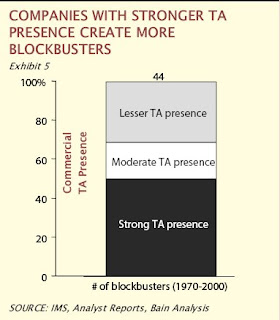
8th November 2007.
Hello,
welcome to an online business discussion blog. I primarily intended to start off a discussion about how and when it would be possible to set up a social networking site for Biotechnology companies (and big pharma). That was >three weeks ago although it seems like it was longer than that.
Since then I have discussed the idea with over twenty people and had some very excited and worthwhile input. Here is the original concern that I had.
The Problem
I believe that the current system that allows for the buying and selling of drug-rights and the companies that make/develop them is basically archaic. In fact it is a bit like buying property was a few hundred years ago in that buyers and sellers have to rely on 'putting the word out' and they also have to rely on someone else being in the market who also wants to either buy or sell accordingly. There is a genuine need for some kind of formal and, perhaps most importantly, transparent exchange.
The intent of this professional/business based networking site would be to swap information, market companies and ideas and to allow the exchange of contacts that would enable companies and investors to evolve and work with one another productively. The nature of the proposed website and the important nuances regarding its content, confidentiality, access, revenue sources etc will all be debated here and hopefully at the end of it all we will arrive at a worthwhile business concept and also we may have encouraged some investors and customers along the way.
Initially the biggest problem that we have to get over is that of disclosure:
Caveat Emptor; Caveat Venditor
- A fundamental issue within any intellectual property-based industry is that oftentimes companies are unwilling to disclose what exactly it is that they have got
- Biotech companies work hard to generate intellectual value and they are often not willing to tell just any old person how they did it and what the result was
- But, to use an analogy, who would buy a car from a vendor that wouldn't let you pop the hood to look at the engine?
- in other words investors and customers however will not invest in ideas that they don't have insight into
- Therein lies a fundamental problem within the industry. You are damned if you disclose and damned if you don't!
- Informal networks and good old fashioned relationships have been the traditional solution to this problem in that they allow for a more careful, sensitive and controlled approach to the uncomfortable business of disclosure
- Through judicious use of networks sellers and buyers can gain something of a view of one another before revealing everything
- A network might even allow for a partial 'reveal' or some trusted 'whispering' to take place before anyone has overly committed
- Networks are intrinsic risk managers when they work well in that a network can manage partial bits of information and risk and a network allows people to operate in discreet and considered ways
Against Networks. Networks can-

- Stifle creativity and punish transparent behaviours
- Tend to strongly favour the establishment and larger players
- Allow for abuse and corruption of information flow
Your turn
I'd like to hear from you on topics such as
- how does such a network pay for itself (there would at most be a few thousand contributing companies and investors)
- Would you value the concept of 'surveyors' who could independently offer valuations/second opinions of summary packages on what a company has to offer
- Should access be private or open
- Would you value themed pages or communities such as an online Monoclonal antibody community or online VEGF community?
- what would companies display that they don't already put on their website?
- would you value the concept of inviting people to join your community at different levels of access?
Since I posted this idea several other postings have pointed me towards the fact that there is a very active community of licensing professionals out there working predominantly at a local level with the occasional foray into global markets. They all, broadly speaking, seem to be of a consultancy ilk. Many have websites and some even post IP opportunities on these websites.
Some have viewed this blog as a non-starter. Some a threat and some a joke but most people tell me I am on to 'something'. The agencies and consultancies out there all do a similar and apparently productive thing. They help people in the early stage of their business. Very few provide what I can see is a functional, usable, searchable 'shop window'. In fact they could help me, they could help the businesses that they intend to help and they could help themselves (more of this later).
The main problem is one of confidentiality. Let me correct myself- the main problem is one of perceived confidentiality.
In fact there is considerable irony here in that many people have gently criticised me for revealing my business idea to 'all and sundry'; they would have preferred at the time that I kept it confidential. But the truth is that revealing my idea has been incredibly helpful and the initial business idea that I had would almost certainly have failed had I not worked it through with others and researched the possibilities (of course it still might fail so 'that's not all folks').
The good news is that I believe that a viable business still remains. Not one offering too much consultancy though - I now have lots of people to refer on to for that. The central idea that an open, transparent exchange should be set up still continues to preoccupy me. The concept has evolved so that this exchange would need to include several (but not too many) layers of access (most of which could be melted within a day or so if required) and a degree of 'chaperoned' confidentiality would have to operate in order to buy peoples' confidence.
I'd like to thank Alex Frost VP of research opportunities at sermo (http://www.sermo.com/) for introducing the idea of arbitrage. Basically the business idea remains the same - a networking website founded with the idea of exchanging drug business credentials. But the participants would receive some of the commission for any referrals that they made. Also the numerous consultancies out there would, as well as receiving commission for their referrals, consider giving me commission on all the work that I referred to them. In the meantime the site would become the focus or centrepoint of all in-licensing/out-licensing activities - a sort of 'first thought' activity. The CEO should think 'Put the business/IP on the site and see what happens - after all it would be posted for free so what harm?'. In the meantime I'll be there to tell him that others will try to discourage him from telling anyone anything. That's right- all biotech CEO's should take a big spade, go out to the parking lot and bury all their ideas.
Customers?
The site will Proceed with caution. Policed user-generated content will be allowed along with the all important 'ratings' of the operators so no sharks please. Of course the ratings will be highly contested and I will not just allow some sort of on-line deformation tool.
This is going to have remain a widely cast net at the moment but I see four main customers
- start ups looking mainly to sell
- big/medium cap pharma and biotech looking to both buy and sell
- in/out-licensing consultancies looking for somewhere to market or gain their clients
- Banks, funds and investor relations firms looking for a market for their clients
That is about the sum of it so far - still not completely cooked as an idea but I am, I believe, beginning to come to some sort of more refined view. And yes thanks to everyone who told me there is no money out there any more. I'd like to know where all the money has been buried but for sure it looks to be disappearing. Thanks for all the great postings and please keep on generating input - it's working!


